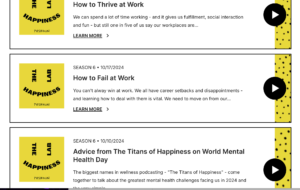On one of the above episodes of "The Happiness Lab with Dr. Laurie Santos," I don't remember which one, I heard a line that stuck with me: We need more Beatles and less Frozen, more "let it be" (and PS, I had no idea Billy Preston played the organ for this song. Were you aware? Why didn't he get more credit?) and less "let it go" in our lives. Since I remember almost nothing these days, the fact that this line stayed in my head long enough for me to make it to my computer and start typing made me think I should give it a ponder.
My husband (Hi, CIO!) hates the expression, "It is what it is." I believe his complaint about the sentiment is how defeatist it sounds. And I hear that, too, so I had to think about how "let it be" differs from "it is what it is." Here's what I came up with. When people say, "It is what it is," what they mean is, I can't change that, though I'd like to. "Let it be" offers a different lens through which to view the situation. It's okay for that reality to exist in the world. The facts of this moment don't need to bother or upset me because they are outside of me. I can know about these truths and go on with my life as I wish. I can't control external circumstances, but I can regulate my responses. And as the song says, "There will be an answer. Let it be." If I acknowledge the facts as they exist, I can learn from them.
Which brought me to think about Elsa's song in Frozen. I wondered what was so wrong about trying to let things go, and here's where I landed. Our brains aren't wired to forget what bothers us. If we try to tell ourselves to ignore something, we end up stuck in a loop of telling ourselves to forget about it (as Johnny Depp explains here) and failing to do so.
But then I listened to the Frozen song for the first time in a while and paid attention to its lyrics. Elsa's not imploring herself to loosen her grip on something; she's giving herself permission to let her powers fly free. She sings about having had to hold her feelings in for too long and allows herself now to strike out. I wonder if the podcast speaker was using the first idea of "let it go," or the second. I think it might be impossible and, therefore counterproductive to try to rid bad thoughts (as long as we're framing them as bad) out of our minds. But it is probably beneficial for us to acknowledge the power(s) we have to enjoy what we can control. When Elsa tries to fit into a quiet and tame box, she's miserable, but once she decides to embrace her true nature, she can "let the storm rage on."
So, you ask, what's the final answer? I think it's that we need to learn both to "let it be" and to "let it go," but only if we define them in ways that remind us to use our minds to control what we can and be okay with what we can't.
Please share your responses in the comments.

I think the trouble becomes when we take “let it be” too far. We need to control our emotions but not ignore the situation. All too many let it be so they don’t have to deal with the frustration. I think it is frustrating to be in the not knowing phase…..let’s change the conversation to make this phase ok!
Good point! Yes, “let it be” shouldn’t make us passive. I am thinking about the counseling department’s advice that we can’t change the waves, but we can learn to surf. We need to understand what’s going on, even if we can’t affect change, so that we can ride the situation out or pivot or move entirely away. I appreciate your advice to “change the conversation,” which of course makes me think of the critical importance of open communication at every level.
Billy Preston played on nearly all the Let It Be sessions. Peter Jackson made a great documentary about it. https://en.wikipedia.org/wiki/The_Beatles:_Get_Back
Yes, that’s a great movie. We both liked watching it, though clearly I didn’t remember enough.